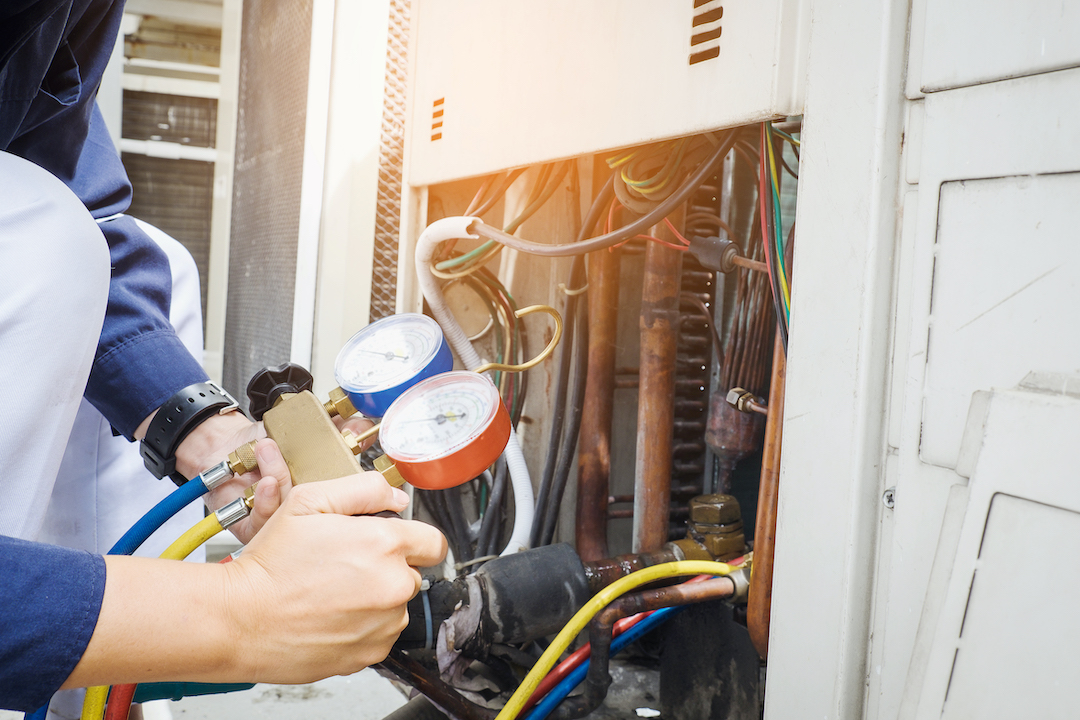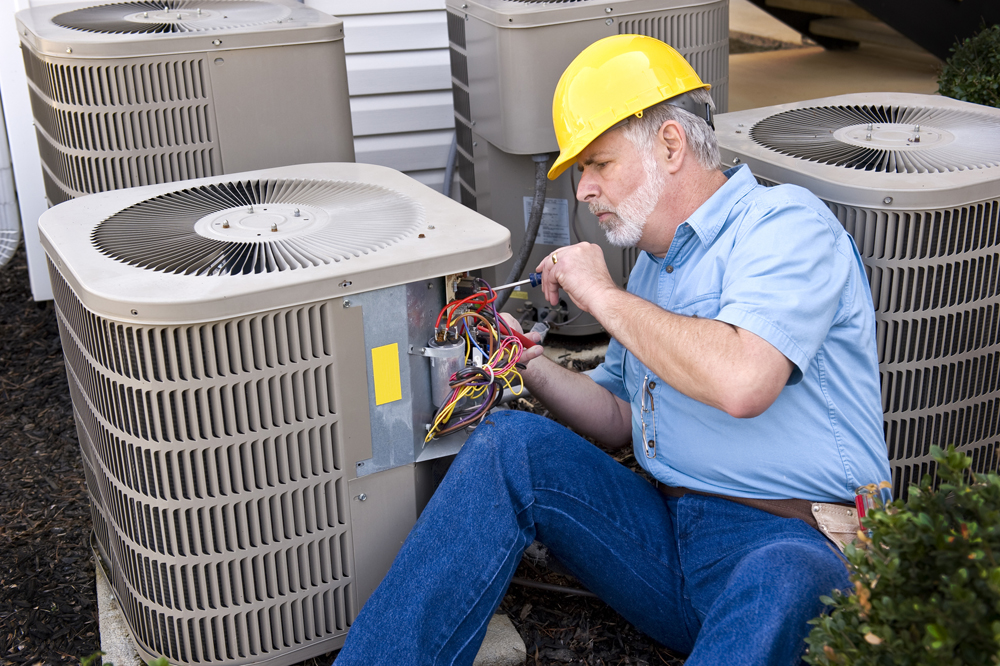Picking In Between a Heatpump and Heating System: Key Considerations for Your Heating And Cooling Needs
When evaluating home heating alternatives for a/c needs, the choice in between a warm pump and a heater can be complicated. Each system offers distinctive benefits tailored to details environments and energy performance objectives. Comprehending these differences is essential for making an enlightened option. Key aspects such as setup prices and ecological impact better make complex the choice process. Which alternative absolutely lines up with one's comfort and sustainability choices? The following sections will certainly check out these factors to consider thoroughly.
Understanding Warmth Pumps: How They Function and Their Benefits
While numerous homeowners take into consideration various home heating options, comprehending just how heatpump feature and their advantages can substantially influence their decision. Warmth pumps operate by transferring warmth rather than producing it. In the winter months, they extract warm from the outdoors air or ground and move it inside your home, while in the summer season, they reverse this procedure, cooling the home by getting rid of warmth outside. This double capability makes them versatile for year-round environment control.One of the main advantages of heatpump is their energy performance. They utilize substantially much less power contrasted to traditional furnace, potentially leading to lower utility expenses (furnace replacement). In addition, heat pumps have a smaller carbon footprint, making them an eco-friendly option. They additionally call for much less upkeep than traditional systems, adding to lasting price financial savings. On the whole, understanding the mechanics and benefits of heatpump can aid homeowners make informed choices regarding their heating and cooling demands
Discovering Heaters: Kinds, Procedure, and Advantages
Furnaces come in various kinds, consisting of gas, electric, and oil models, each with distinct operational devices. Recognizing these distinctions is necessary, as they affect performance and heating efficiency. In addition, heaters supply numerous advantages, such as regular heat outcome and reliability in colder environments.
Sorts of Furnaces
Home heating systems can vary considerably in layout and procedure, with furnaces being a preferred option among home owners. There are a number of kinds of heaters, each using different gas sources and technologies. Gas heaters prevail, leveraging gas to generate heat effectively. Electric heating systems, on the various other hand, use electric resistance to produce warmth, usually favored for their straightforward setup. Oil furnaces, while much less common, work in locations with limited gas gain access to (ductless mini splits). In addition, condensing heaters optimize energy effectiveness by catching and reusing exhaust gases. Each type operates through a system of warmth exchangers and ductwork to disperse cozy air throughout a home. Understanding the distinctions between these furnace kinds is crucial for notified HVAC decisions
Advantages of Furnaces
For property owners looking for reliable warmth during cold months, the benefits of heaters are substantial. Heaters give regular home heating, making sure even temperatures throughout the home. They are especially efficient in extreme cold, often surpassing heat pumps in freezing problems. Various types, including gas, electrical, and oil heating systems, use versatility to satisfy diverse needs and preferences.Furnaces likewise often tend to have reduced first setup prices compared to heatpump, making them an extra easily accessible alternative for lots of. Their robust layout contributes to a longer life expectancy, with lots of units lasting over 15 years with appropriate upkeep. Furthermore, modern-day heating systems are frequently equipped with innovative innovation for improved effectiveness, which can cause decreased power bills. Overall, heating systems stay a trustworthy choice for effective home heating.

Power Effectiveness: Contrasting Heat Pumps and Furnaces
When contrasting energy performance between heatpump and heaters, the Seasonal Energy Efficiency Proportion (SEER) plays an essential function in figuring out efficiency. Additionally, an operational expense evaluation discloses the lasting financial implications of each system. Comprehending these aspects can lead property owners in making notified choices regarding their home heating remedies.
Seasonal Power Performance Ratio
Energy efficiency plays a vital function in the decision-making procedure in between heat pumps and furnaces, particularly when thinking about the Seasonal Power Effectiveness Ratio (SEER) This statistics measures the cooling effectiveness of warmth pumps over a whole air conditioning season, supplying a standardized method to examine performance. Higher SEER rankings suggest higher energy efficiency, translating to reduced power intake and minimized utility bills. On the other hand, heaters are generally evaluated using the Yearly Gas Use Effectiveness (AFUE) rating, which reflects home heating effectiveness. When comparing these 2 systems, home owners must prioritize SEER ratings for heatpump, as they straight effect overall power financial savings and environmental sustainability. A complete understanding of SEER can significantly influence the lasting fulfillment and cost-effectiveness of the selected HVAC remedy.
Operational Price Analysis
Understanding the functional costs related to heatpump and furnaces is vital for homeowners reviewing their choices. Warmth pumps commonly provide higher energy performance, converting electrical energy right into heat with marginal waste. This results in reduced monthly energy bills, particularly in modest climates. Alternatively, conventional heaters, especially gas versions, may have reduced in advance prices but can sustain greater operational costs with time because of sustain rates and effectiveness ratings.Moreover, heatpump can function as both heating and cooling down systems, possibly decreasing the demand for separate cooling and heating units. While Full Article preliminary financial investments for heatpump may be greater, their long-term savings in energy performance can make them a much more economical option for many houses. Careful analysis of regional energy prices is necessary to figure out the very best alternative.
Installation Prices: What to Anticipate for Each Heating System
Installation costs for heating unit can vary significantly in between warmth pumps and heaters, affecting home owners' decisions. Heat pumps generally have higher upfront installation costs, generally ranging from $3,500 to $8,000, depending upon the unit dimension and complexity of setup. This consists of the outdoor device, indoor handling system, and needed ductwork adjustments. Alternatively, heaters have a tendency to have reduced preliminary see here expenses, averaging in between $2,500 and $6,000, which can be appealing for budget-conscious home owners. Setup expenses can raise if considerable ductwork is required.Moreover, the option of fuel kind for heaters-- all-natural gas, lp, or electric-- can additionally affect setup prices. While heatpump provide energy effectiveness, their initial financial investment might deter some customers. Eventually, assessing installation expenses alongside lasting cost savings and performance will aid house owners in making informed choices about their heater.
Climate Considerations: Which System Executes Better in Your Location
How do environment problems affect the effectiveness of heating unit? The performance of warm pumps and furnaces can vary significantly relying on the local environment. In modest climates, heatpump excel by effectively moving heat from the outside air, making them an energy-saving choice. However, their effectiveness lessens in incredibly chilly temperatures, where they may have a hard time to remove sufficient warm. On the other hand, heaters, particularly gas models, supply dependable and constant heat despite outdoor conditions, making them more suitable in cooler regions.In locations that experience milder winters months, heat pumps can operate successfully year-round, providing both heating and cooling. On the other hand, regions with rough wintertimes usually take advantage of the effectiveness of furnaces. Ultimately, understanding the local environment is essential when deciding between a heat pump and a heater, as it straight influences their operational performance and total efficiency.
Upkeep Demands: Long-Term Look After Warmth Pumps vs. Furnaces
While both warm pumps and heaters need regular upkeep to ensure peak efficiency, their certain needs and treatment routines vary considerably. Heaters typically need much less regular focus, with annual assessments being sufficient to inspect for gas leaks, clean filters, and evaluate total functionality. Their simpler design typically enables for straightforward repairs.In contrast, warm pumps demand biannual upkeep as a result of their twin function in heating & cooling. This consists of cleaning coils, checking cooling agent levels, and making sure that both the exterior and indoor units operate at their best. In addition, heatpump upkeep frequently entails more elaborate parts, making professional maintenance essential.Neglecting maintenance can cause diminished effectiveness and increased energy expenses for both systems. Ultimately, property owners should think about these lasting treatment requirements when choosing between a warm pump and a heater, as aggressive upkeep can extend the lifespan and performance of either system significantly.
Environmental Effect: Selecting a Lasting Home Heating Alternative
The ecological effect of home heating systems is a crucial evaluation for property owners seeking sustainable choices. Warm pumps are normally extra energy-efficient than typical furnaces, as they move warmth as opposed to generate it, significantly decreasing carbon discharges. By using renewable resource sources, such as geothermal or air-source heatpump, homeowners can further lessen their ecological footprint.On the various other hand, all-natural gas heating systems discharge greenhouse gases and add to air pollution, though they frequently offer higher warmth outcome. Improvements in modern technology have actually led to the development of high-efficiency furnaces that reduce emissions.Ultimately, choosing a home heating system entails evaluating performance versus ecological effect. Property owners are encouraged to review neighborhood energy resources and rewards for eco-friendly systems, ensuring an option that my website straightens with both personal convenience and environmental responsibility. The choice impacts not just prompt comfort but also long-term sustainability and environmental health.
Often Asked Questions
The Length Of Time Do Heat Pumps and Furnaces Usually Last?
The lifespan of warm pumps generally varies from 15 to twenty years, while heating systems can last between 15 to three decades. Routine maintenance substantially affects their long life and efficiency in offering home heating options.
Can I Make Use Of a Heat Pump in Extremely Cold Climates?
Heat pumps can run in extremely cold environments, yet their performance reduces as temperatures decrease. In such problems, additional heating resources might be needed to maintain comfortable interior temperature levels and assure peak efficiency.

What Is the Noise Level of Warm Pumps Versus Furnaces?
The sound levels of warm pumps and heating systems differ significantly. Normally, heatpump operate more quietly than traditional furnaces, making them more effective for those conscious sound, while furnaces may create louder operational sounds during heating cycles.
Are Warmth Pumps Suitable for Both Heating & Cooling?
Heat pumps are indeed appropriate for both cooling and heating (heat pump installation ooltewah tn). They function by transferring heat, supplying efficient temperature control year-round, making them a functional option for home owners seeking an all-in-one a/c remedy
What Dimension Furnace Do I Required for My Home?
Establishing the suitable size furnace for a home needs assessing factors such as square footage, insulation top quality, local environment, and the home's layout. Consulting a specialist can ensure an accurate evaluation and ideal convenience. Heat pumps normally use greater energy efficiency, transforming electrical power into warmth with marginal waste. In modest environments, warmth pumps succeed by successfully transferring warmth from the outdoors air, making them an energy-saving option. On the other hand, heating systems, specifically gas designs, give constant and dependable warm no matter of outdoor problems, making them preferable in cooler regions.In areas that experience milder winters months, warm pumps can run effectively year-round, providing both home heating and cooling. Warmth pumps are normally more energy-efficient than traditional heating systems, as they move warmth instead than create it, significantly reducing carbon discharges. By utilizing sustainable energy resources, such as geothermal or air-source warmth pumps, house owners can additionally reduce their ecological footprint.On the other hand, all-natural gas furnaces send out greenhouse gases and contribute to air pollution, though they commonly offer higher warm output.